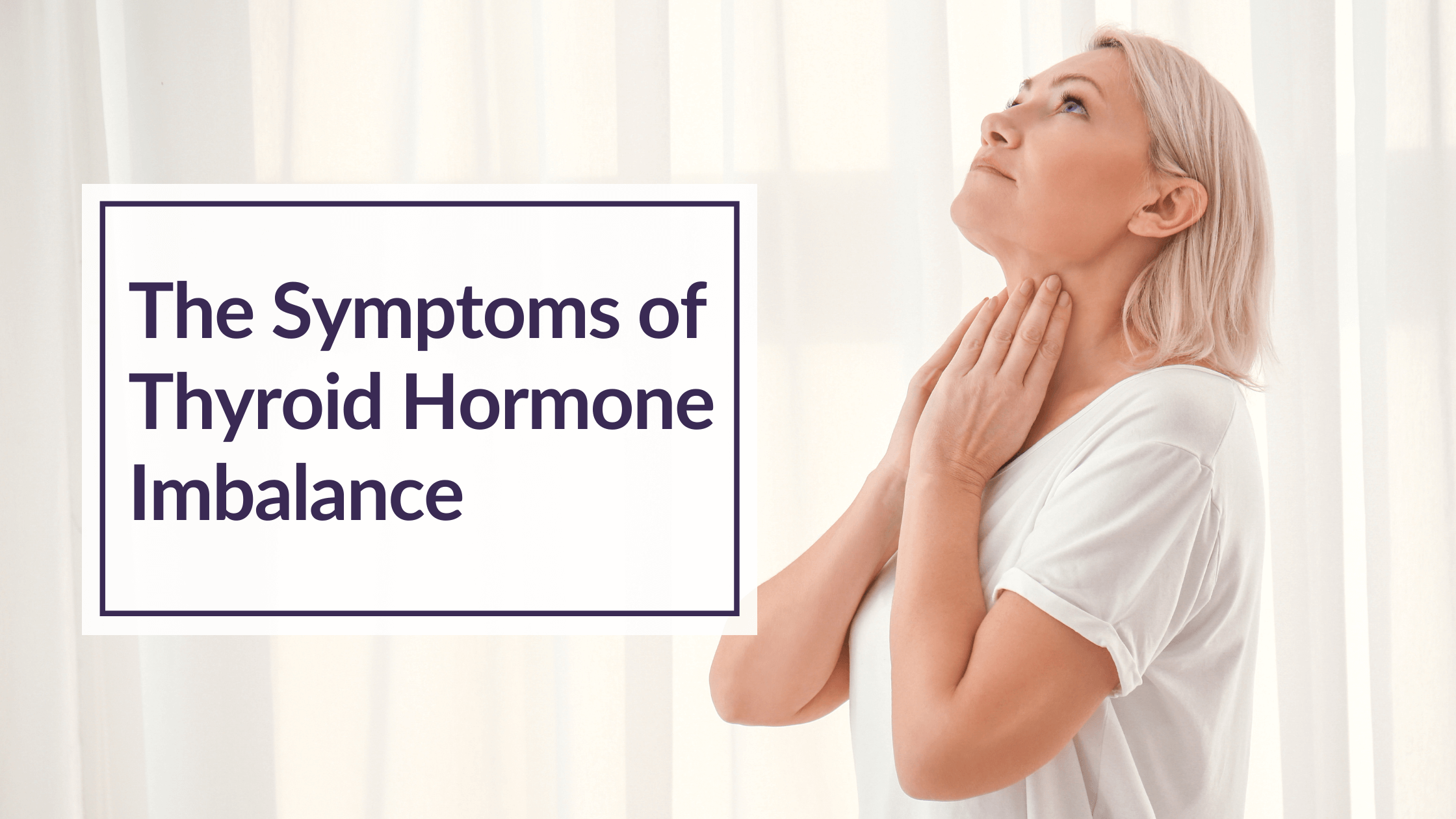
The Delicate Dance of Thyroid Hormone Balance
Thyroid hormone imbalance seems to plague more women than men. Thyroid function is necessary for how your body works metabolically day to day. Thyroid hormones affect all of your cells! We think of metabolism when we think of the Thyroid, but your Thyroid also affects your brain and emotional well-being.
 This small, butterfly-shaped gland is part of your Endocrine System and is located in your neck. It’s responsible for producing hormones that regulate:
This small, butterfly-shaped gland is part of your Endocrine System and is located in your neck. It’s responsible for producing hormones that regulate:
- Your body’s metabolism
- Energy levels
- Digestive function
- Heart rate
- Your Immune System
When your Thyroid hormones are in balance, you feel energized, focused, and emotionally stable. However, an imbalance in these hormones can lead to many symptoms that can significantly impact your mood and feelings.
Supporting Thyroid hormone imbalance is an important part of any wellness endeavor. This blog post will help you identify some common symptoms of Thyroid hormone imbalance and help you take proactive steps with natural ways to support your Thyroid.
Understanding the Thyroid Gland and Hormones
The Thyroid gland produces two primary hormones: thyroxine (T4) and triiodothyronine (T3). These hormones work together to regulate your body’s metabolism, temperature, heart rate, and many other important functions. When the Thyroid gland produces too much or too little of these hormones, it can lead to Thyroid hormone imbalance.
In the allopathic world, there are some specific types of Thyroid imbalances.
1. Hyperthyroidism – occurs when the Thyroid gland produces too much T4 and T3, causing your body’s processes to speed up. Grave’s disease is a specific condition in which the Immune System causes the Thyroid to become overactive. Too much Thyroid hormone is produced, and there may be swelling in the Thyroid area, which is called a goiter.
2. Hypothyroidism – happens when the Thyroid gland doesn’t produce enough T4 and T3, causing your body’s processes to slow down. A specific form of hypothyroidism is called Hashimoto’s Thyroiditis. This condition more commonly affects women.
Thyroid hormone imbalance can manifest in so many different symptoms, and the specific symptoms you experience will depend on whether you have an underactive Thyroid or an overactive Thyroid.
It’s important to note that not everyone will experience all of the symptoms, and the severity of the symptoms can vary from person to person.
Please visit your licensed healthcare provider if you suspect that you have a Thyroid health issue!
Do Thyroid hormones act differently in men and women? We’ll dive into this a bit more after we discuss the things that may throw your Thyroid off in the first place.
Why Thyroid Hormones Become Unbalanced
The Thyroid is noted as one of the organs most affected by autoimmune conditions. Research examines how the environment, genes, and nutrition impact your Thyroid.
- Genetics. The Clinical Biochemist Review Journal notes that genes play a significant role in the amount of Thyroid hormones produced, TSH concentration, and susceptibility to immune issues associated with your Thyroid.
- Environment. The term “toxins” is very broad. Toxicity can occur in us, such as gut dysbiosis, and around us, with things like pesticides. We know that environmental iodine, Epstein-Barr virus, Hepatitis C, and environmental chemicals will impact the function of the Thyroid. The internal environment of your gut will determine the integrity of your intestinal barrier (the gut lining). While all conditions are not yet completely proven, we are seeing an increasing number of chronic health issues linked to the gut environment.
- Nutrition. One of the most glaring nutrients that affect Thyroid hormone balance is iodine. The Thyroid cannot make T4 and T3 without this mineral. Yet, too much iodine can inflame the Thyroid gland. Minerals like iron, selenium, magnesium, zinc, Vitamins A, D, and E, and adequate protein intake (for all your essential amino acid needs) all support your healthy Thyroid balance.
Thyroid Hormone Imbalance in Men and Women
Women are more susceptible to Thyroid hormone imbalances than men, particularly during significant life events such as pregnancy, postpartum, and menopause. Hormonal changes during these periods can disrupt the delicate balance of Thyroid hormones, leading to a range of symptoms.
Women may also be more prone to autoimmune conditions that involve the Thyroid gland, directly or indirectly. Thyroid hormone balance can also affect the menstrual cycle.
Men will also experience Thyroid imbalances, and both sexes can share similar symptoms.
Both women and men need to be aware of the potential signs of Thyroid hormone imbalance. Bloodwork can help identify some of the signals in the body that make the Thyroid function. Usually, your doctor will test for TSH or thyroid-stimulating hormone, which comes from the Pituitary Gland in both sexes. Some physicians will test free T4 and T3, Thyroglobulin AB, and Thyroid peroxidase AB.
Thyrotropin Releasing Hormone (TRH) comes from the Hypothalamus, signals the Pituitary gland, and helps it release TSH. Our bioenergetic testing process uncovers subtle energetic links between organ stress, nutritional deficiencies, and hormones such as TSH. We bioenergetically test your hair and saliva to look for patterns related to imbalances of T3 and T4. Other body systems, such as the Liver and the Adrenals, influence your energetic balance.
Symptoms of Thyroid Hormone Imbalance
The symptoms in men may be similar to those experienced by women, but there may also be some gender-specific differences.
For example, men with hyperthyroidism may experience decreased muscle mass and increased fat accumulation, while those with hypothyroidism may struggle with erectile dysfunction.
Thyroid dysfunction may play a role in infertility in both men and women.
SCAN TIP: Stress in the hypothalamus and pituitary gland would be bioenergetically detected on a Full Scan along with TSH in the energetic hormones section. We do not bioenergetically test for TRH but look to that stress in the Endocrine System which may show up as the Pituitary, the Adrenal glands, or the Hypothalamus.
Symptoms of Thyroid Hormone Imbalance in Both Sexes
1. Weight Changes: If the Thyroid is too active, unintentional weight loss may occur, whereas an underactive Thyroid may result in weight gain or difficulty losing weight.
2. Fatigue and Low Energy: Feelings of tiredness and lethargy are common with an underactive Thyroid, while overactivity of the Thyroid can lead to restlessness and difficulty sleeping.
3. Changes in Body Temperature: Thyroid hormone imbalances can cause increased sweating, sensitivity to heat, and feeling cold more easily.
4. Hair, Skin, and Nail Changes: An out-of-balance Thyroid can cause thin, brittle hair and nails, dry skin, and coarse hair. This might show up as Integumentary System stress on a bioresonance scan.
5. Muscle and Joint Pain: Muscle aches, joint pain, stiffness, muscle weakness, and tremors may be linked to Thyroid stress. The Locomotor System may appear weak on a Full Scan if subtle energetic stressors are rooted in the Thyroid.
6. Digestive Issues: Both an overactive and an underactive Thyroid can cause digestive stress. An overactive Thyroid tends to cause increased bowel movements and diarrhea, while an underactive Thyroid causes constipation and bloating.
7. Irregular Menstrual Cycles: Thyroid hormone imbalance can affect the regularity and flow of menstrual periods in women. It’s essential to recognize that hormones work with each other and with the Nervous System!
8. Mood Changes: anxiety, irritability, mood swings, depression, and apathy may be linked to Thyroid hormones.
9. Cognitive Impairment: That brain fog you may be experiencing? An imbalanced Thyroid can affect your thinking, processing, memory, concentration, and decision-making!
10. Changes in Libido: Thyroid hormone imbalance can impact sexual desire and function. Another key way that hormones have a delicate dance to perform together.
Body Systems Connected to Your Thyroid
Your Thyroid gland doesn’t operate in isolation; it’s linked to every organ system in the body.
1. The Digestive System: People with low Thyroid function can have digestive issues. We mentioned constipation. However, you may also have indigestion, low iron and mineral status, and even gallstones. Many of our clients have Digestive System stress along with bioenergetic imbalances in their digestive enzymes and hydrochloric acid. Proper acidity is needed to liberate minerals, amino acids, and vitamins from your food AND kill microbes that do not belong in your gut!
2. Your Cardiovascular System: Thyroid hormones help regulate heart rate, blood pressure, and cholesterol levels.
3. Muscles: Your Thyroid hormones help build muscle fibers, specifically fast-twitch fibers. Balanced Thyroid hormones will help with athletic performance and muscle maintenance later in life.
4. Reproductive System: Thyroid hormone imbalances can affect fertility, menstrual cycles, and sexual function in both men and women.
5. Nervous System: Thyroid hormones are essential for proper brain function and can impact mood, cognition, and overall neurological health.
6. Metabolic System: Thyroid hormones are the primary regulators of your body’s metabolism, affecting energy levels, weight management, and overall body composition.
Top Tips and Takeaways for Balancing Thyroid Hormones
Do you think you have a Thyroid hormone imbalance? There are several natural ways to support your Thyroid and work toward a balanced state.

1. Mineral Balance: Eat a nutrient-rich diet that includes iodine, selenium, magnesium, and zinc. The highest concentration of selenium is found in the Thyroid, and Thyroid autoimmunity may be linked with low selenium.
2. Vitamin Intake. Low Vitamin D has also been linked to hypothyroidism. Vitamin E’s antioxidant function plus B Vitamins support Thyroid hormone balance.
3. Blood Sugar Balance. This can affect hormones and hormonal glands of the Endocrine System, such as the adrenal and the pituitary glands. These glands are sensitive to blood sugar swings, ultimately affecting the Thyroid. The pituitary gland signals the Thyroid (it has to release thyroid-stimulating hormone, remember?)
4. Liver Support. Your master detoxification organ is so important to those Thyroid hormones! It has to activate and inactivate, transport, and metabolize them. An overworked liver may be unable to carry out all its jobs optimally. One big job rests on Phase 2 to help turn that T4 into the T3 that your body needs! This phase depends on cruciferous veggies, magnesium, amino acids, and other nutrients. An overworked liver or a toxic liver may lead to hormone imbalance.
5. Parasites and the Thyroid. Helminths are the term for parasitic worms. They may be linked to hypothyroidism and other Thyroid issues. This could be because parasites affect your immune response and decrease your defense systems.
6. Sleep: Adequate sleep is important for maintaining healthy Thyroid function, as sleep deprivation can contribute to hormone imbalances.
7. What about supplements? Certain herbs, such as ashwagandha and Lemon balm, have been shown to positively impact Thyroid health.
8. Food sensitivities. Is there a link between gluten intake and Thyroid stress? This study noted an increased amount of Thyroid issues in those with celiac disease. What about gluten sensitivity? Those with food sensitivities to dairy, soy, or gluten may also see energetic stress that will be noted as “Thyroid and Thymus.” Many clients note that they feel better, and Thyroid hormone imbalances lessen when they take out gluten specifically.
Whether you want to make changes to your lifestyle or embark on a parasite cleanse to see if your Thyroid hormone balance shifts, CBH Energetics is here to help. Bioenergetic testing can reveal which organs are energetically stressed and the specific amino acids your liver needs that may be imbalanced. Supporting your liver can be a huge step in supporting symptoms of Thyroid hormone imbalance. When you learn more about the needs of your Liver and Thyroid through our process, you will see that both organ systems are mineral and vitamin-hungry!
DISCLAIMER: Balanced Health, LLC/CBH Energetics and any parent, subsidiary, affiliated, or related entities and companies do not provide medical advice or services. This post and the bioenergetic products and services offered by Balanced Health, LLC/CBH Energetics including, but not limited to, bioenergetic tests, bioenergetic scans, bioenergetic reports and related products and services (collectively the “Bioenergetic Products and Services”) are designed for educational and informational purposes only and are not intended to diagnose, treat, cure, or prevent any disease, condition, complaint, illness or medical condition and are not a substitute for professional services or medical advice. Testing is not used for the purpose of obtaining information for the diagnosis, prevention, or treatment of disease or, the assessment of a health condition or for identification purposes.
